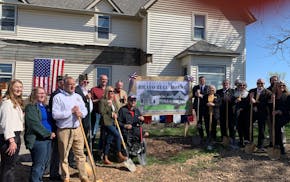Minnesota's largest park system got an unpleasant surprise this summer when it sent out bids for a job to expand one of its vast network of metro area trails.
Only one contractor responded when Three Rivers Park District advertised its project for a 2.4-mile link on its Crystal Lake Regional Trail, far fewer than expected. And that one came in at $2.8 million, more than $1 million over the construction cost estimated by the Park District's engineer.
Three Rivers rejected it, along with bids for two other projects that also came in too high.
All across the Twin Cities, there are signs that the heated-up construction market is taking a toll on communities' plans for new or improved parks, trails, utilities and roads. Cities are redesigning projects and putting others on the back burner in the hope the work can be rebid later at a more reasonable cost.
"Just because we would like to so something this year doesn't mean we have to do it this year, at any price, under any circumstances," said Eden Prairie City Manager Rick Getschow. The city recently rejected bids to reconstruct some of its tennis and basketball courts and plans to re-advertise the project next year.
"Everybody seems to be busy," said Paul Oehme, director of public works in Chanhassen, where plans for a trail connecting the city to Shorewood have been set aside. The Shorewood City Council last week voted to reject the only bid on the jointly funded project because it was too high and will rebid the job next year.
"It's a risk," Oehme said. "But we need to try, and if it's not any better, then we're stuck and we'll need to decide if we want to build the trail at all."
In addition to a general uptick in the economy, big projects like the Mall of America expansion and stadiums under construction in downtown Minneapolis and St. Paul are keeping contractors busy. In Minnesota, the value of nonresidential building contracts through the end of July was up more than 50 percent compared with the same period last year, according to McGraw Hill Construction, a widely read industry barometer.
Contractors that downsized during the recession have hired more workers in the last couple of years but are still scrambling to keep up with the rebound. Harry Melander, president of the Minnesota Building and Construction Trades Council, estimates the current metro area construction workforce at 60,000. That's about 10,000 more workers than the lowpoint in 2010, but far below the prerecession peak of almost 80,000, according to the Minnesota Department of Employment and Economic Development.
"A lot of people in construction simply left the business during the downturn and went back to school or started other careers. Some moved to North Dakota to work in the oil fields," said Dan Mehls, a vice president of project development at Mortenson Construction. Mehls said carpenters, electricians and construction crew foremen are among those now in short supply.
A flurry of factors
With more jobs from which to choose and fewer workers, construction firms can be more selective about projects. Bloomington got just one response when it advertised a project to install 20 rain gardens for stormwater control on the east side of the city. "Normally, I'd expect to get at least three or four," said City Engineer Shelly Pederson.
But the bid by Vadnais Heights-based Urban Companies was below the city's budget target, which may have been because Bloomington advertised early in the year when contractors are still filling their summer schedules.
This year some cities that bid later have had trouble because heavy rains in the spring and early summer put many contractors behind schedule. Even in the best of years, "Minnesota has a very defined construction season," said Don Elwood, Minneapolis' director of transportation planning and engineering. He said it's not unusual for the city to bid in the fall on work that won't begin until the following year.
This year's flurry of building activity also has sparked demand for some raw materials, driving up costs.
"Metals in particular are much more expensive than a couple years ago," said Jonathan Vlaming, Three Rivers' associate superintendent. "The costs for bridges have gone through the roof." Roseville cut back the number of miles of streets it sealcoated this summer, in part because of higher material prices, said City Manager Pat Trudgeon. "We are adjusting to the fact that we're not getting as much for our dollar, but that seems to be the new reality," he said.
Mortenson recently reported that construction labor and material costs have risen more rapidly in the metro area than nationwide. The company believes the increases will continue over the next year.
Hoping for stability
The prospect of even higher prices down the road can leave a city with little choice on high-priority jobs. When Blaine sought bids on a small storm sewer project it got only one that came in at $4,000 more than the $25,000 estimate. City Manager Clark Arneson said he will recommend the City Council accepts it. "This is something we'd like to get done before spring," he said. "If you delay, is it really going to be cheaper?"
In addition to the Crystal Lake trail extension, Three Rivers also rejected as too high bids it received for a bridge spanning a two-lane highway on its Lake Minnetonka LRT Regional Trail and restrooms at Noerenberg Gardens in Orono. The Park District plans to explore lower-cost alternatives for both.
It will rebid the trail job early next year. "If it comes back significantly higher or even the same, we'll go the board and ask if this is still a sound investment," Vlaming said. "I'm hoping things will stabilize in the next few years."
Susan Feyder • 612-673-1723

New sober house for veterans in southern Minnesotan wants to treat the real issue: PTSD
Two North Loop condos combined into one 'dreamy' space listed for $649,900

Minneapolis murder suspect arrested after decadelong escape
What to know about a possible Minnesota equal rights amendment on abortion rights
